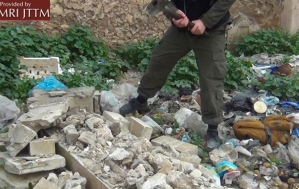
The deadly Islamic State terrorist group has released disturbing photographs of its militants destroying ancient Christian graves with sledgehammers and carving out crosses in the ancient Iraqi city of Mosul.
The Daily Mail reports that images of the shocking act were posted on ISIS-linked social media accounts under the title "Leveling Graves and Erasing Pagan Symbols." Along with the photos, the extremist group released a statement attempting to justify the destruction by arguing that the "graves above the ground suggested that the dead person was closer to Allah than the living, so must be demolished and any images on the graves must be erased."
Steven Stalinsky, executive director of The Middle East Media Research Institute (MEMRI), told Fox News that by posting the images on social media, the group was sending a message to the West.
'It is important to note that ISIS is documenting its destruction and desecration of Christian sites and its attacks on Christian communities, and on other minorities' sites and communities, and is disseminating these images worldwide via social media,' he said.
"By doing this, ISIS is not only showcasing what it is doing, but is also mocking the West by demonstrating that it is doing so freely, with no one trying to stop it."
Mosul, formerly home to thousands of Christians, has been occupied by ISIS since June 2014 and is considered to be the main stronghold for the terror group in the region. Once ISIS took over the city, it issued an edict to drive out the remaining Christian citizens and offered an ultimatum: convert to Islam or die. In January, the U.S. began to coordinate airstrikes with Kurdish forces to take back Mosul, and a major offense will take place there in the next few months, according to the AFP.
The disturbing destruction in Mosul is the latest in a string of attacks on Christianity's heritage, which ISIS is steadily erasing from the Middle East.
Earlier in April, the 3,000 year old city of Nimrud, once the jewel of Assyria and home to a treasure considered one of the 20th century's main archaeological finds, was destroyed by explosives and militants armed with power tools.
In video footage of the destruction which terrorist group circulated across the internet, a jihadist says, "God has honored us in to remove all of these idols and worshipped instead of Allah."
The militants have also destroyed the ancient Iraqi city of Hatra, a UNESCO World Heritage site, and sold priceless Christian relics and other items to fund their activity.
"These heinous acts... point to the material obliteration of history, of people's diversity and often a society's complex, multifaceted nuanced identity," writes Richard Kurin, the Smithsonian's Under Secretary for History, Art, and Culture.
"[ISIS] cynically loots and sell what they can carry off, using such treasures to help finance further destruction," he laments. "Cultural heritage...is under attack as a strategic pillar of extremist warfare. It is a war on civilization itself-whether that be Islamic, Jewish, Christian, Hindu or Buddhist, eastern, western or indigenous."
The UN's cultural agency condemned the act on Monday.
'I condemn this mad, destructive act that accentuates the horror of the situation,' UNESCO head Irina Bokova said in a statement. 'With their hammers and explosives they are also obliterating the site itself, clearly determined to wipe out all traces of the history of Iraq's people,' Bokova added.







